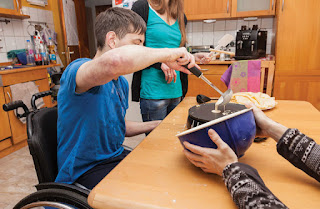What are the advantages of vocational rehabilitation?
Assistance for those with physical or mental limitations to return to the workforce or gain new employment is referred to as vocational rehabilitation. It plays a crucial role in helping individuals with disabilities achieve greater independence in their daily lives. This post will explore the benefits and services offered through vocational rehabilitation, focusing on independent living.
Benefits of Vocational Rehabilitation
Vocational rehabilitation offers numerous benefits to those with disabilities or injuries, including:
Improvement of overall quality of life
Physical and mental health improvements: Returning to work can positively impact an individual's physical and mental health, providing a sense of purpose and self-worth, as well as reducing feelings of depression and anxiety.
Gaining independence and self-sufficiency: Vocational rehabilitation can assist in becoming more self-sufficient by providing the necessary skills and resources to succeed in the workforce, which also plays a crucial role in achieving independent living.
Economic advantages:
Increasing income and financial stability: Returning to work can increase an individual's income and lead to financial stability, resulting in an improved standard of living and reduced poverty.
Reduced dependence on government assistance: Vocational rehabilitation can assist in becoming more self-sufficient and reduce reliance on government assistance programs.
Social benefits
Strengthening relationships with family and friends: Returning to work can improve relationships with family and friends by providing a sense of purpose and self-worth.
Achieving a sense of purpose and self-worth: Vocational rehabilitation can assist in achieving one's full potential in the workforce and improve the overall quality of life.
Vocational Rehabilitation Services
A variety of services are available to assist in returning to work and achieving independent living, such as:
Assessments and Evaluations
Determining abilities and limitations: Vocational rehabilitation assessments can identify an individual's skills and limitations to determine suitable employment options and necessary support and accommodations for independent living.
Identifying suitable employment: Once abilities and limitations have been established, vocational rehabilitation specialists can assist in identifying suitable employment options that align with an individual's capabilities.
Training and Education
Skill development and job readiness training: Vocational rehabilitation services can provide skill development and job readiness training to succeed in the workforce.
On-the-job training and apprenticeships: On-the-job training and apprenticeships provide hands-on experience and the opportunity to learn new skills.
Job Placement and Support Services
Assistance with job searching and resume building: Vocational rehabilitation services can provide job search assistance and assist in creating a resume that highlights an individual's skills and abilities.
Ongoing support and follow-up services: Vocational rehabilitation services can provide ongoing support and follow-up services to ensure success in a new job and achieve independent living.
Conclusion
Vocational rehabilitation offers a wide range of benefits and services for those with disabilities or injuries. It can assist in returning to work, achieving full potential in the workforce, and improving the overall quality of life. Additionally, it plays a crucial role in achieving independent living. Suppose you or someone you know has a disability or injury and is interested in returning to work or achieving independent living. In that case, exploring the vocational rehabilitation services available is essential. Resources such as your state vocational rehabilitation agency or non-profit organizations, such as Northeast Independent Living Program, or NILP, that focus on vocational rehabilitation can assist in getting started.



Comments
Post a Comment